Are you passionate about event planning but unsure how to take your career to the next level? Event planning certifications could be the game-changer you’ve been seeking! In today’s competitive landscape, having the right credentials can make all the difference. These certifications offer more than just a title; they provide valuable skills, industry knowledge, and a competitive edge.
Importance of Event Planning Certifications
Before we proceed, we must grasp the difference between event planning certifications and certificates. Particularly in the U.S., certifications are awarded by professional associations, granting you the esteemed title of a “certified event planner” and an event planner license. Renowned organizations like the Events Industry Council (EIC), the International Live Events Association (ILEA), and the Meeting Professionals International (MPI) often provide event planning certifications.
On the other hand, a certificate in event management indicates the completion of an event planning course from a school or program, regardless of industry recognition. Any educational organization can offer an event planning diploma.
Understanding the difference between event planning certifications and certificates is essential, as certifications carry more weight and recognition in the industry. However, ongoing education and event management courses can still be valuable for skill development and specialization in niche areas.
Whether you’re a seasoned event professional looking to upskill or someone just starting in the field, investing in event planning certifications and education can unlock a world of opportunities for you. They can boost your confidence and pave the way for a successful and fulfilling career in the event industry.
Advantages of Pursuing Event Planning Certifications
Event planning certifications have emerged as a crucial pathway for professionals seeking to stand out in the competitive market and deliver exceptional experiences to their clients. These certifications not only validate your expertise but also equip you with a comprehensive skill set and industry insights, enabling you to tackle diverse challenges with confidence.
Let’s explore the top 8 advantages of pursuing event planning certifications.
1. Enhanced Credibility and Professionalism
Obtaining event planning certifications boosts your credibility in the industry. Clients, employers, and collaborators view certified event planners as more reliable and competent professionals. Certification validates your expertise and adherence to industry standards, making you a trustworthy choice for planning successful events.
2. Expanded Career Opportunities
Event planning certifications open doors to a wide range of career opportunities. Certified event planners are preferred candidates for event management roles and can explore diverse sectors such as hiring fairs, conferences or corporate event planners. Event planning programs equip you with the skills and knowledge to take on challenging projects and advance your career trajectory.
3. Comprehensive Skill Development
Event planning certifications offer comprehensive event planner training, covering all aspects of event planning from conception to execution. You’ll gain expertise in budgeting, logistics, vendor management, marketing, risk assessment, and more. These skills are vital for planning successful events and confidently handling unforeseen challenges.
4. Networking and Industry Connections
Certifications provide opportunities to connect with other event professionals, industry leaders, and organizations. Networking not only fosters mentorship and collaboration but can also lead to referrals and potential partnerships, expanding your reach and influence within the event planning community.

5. Competitive Edge in the Market
In a competitive job market, event planning certifications set you apart from other candidates. Employers often prioritize certified professionals, knowing that they bring specialized knowledge and a commitment to excellence. Certification demonstrates your dedication to continuous learning and staying current with industry trends.
6. Increased Earning Potential
Individuals with event planner certifications typically command higher salaries than their non-certified counterparts. As your expertise and reputation grow, you become a valuable asset to employers and clients, leading to better compensation and negotiation power for your services.
7. Adaptability to Industry Trends
The event industry constantly evolves, with new technologies and trends shaping how events are planned and executed. Event planning programs incorporate the latest industry practices, keeping you up-to-date with cutting-edge tools and strategies, and ensuring your event planning approach remains relevant and competitive.
8. Confidence in Event Execution
Finally, knowing you have undergone rigorous training and earned a certification instills confidence in your abilities as an event planner. From managing event timelines to handling emergencies, you’ll approach each event with the assurance that you have the skills and knowledge to deliver a seamless and unforgettable experience for clients and attendees.
Understanding Different Certification Options
Exploring event planning certifications can be exciting yet overwhelming, given the multitude of options available. Each program comes with distinct advantages, specialized training, and recognition levels in the industry. Understanding these certification choices is crucial for making an informed decision that aligns with your career goals and aspirations.
Top 3 Event Planning Certifications
1. CMP (Certified Meeting Professional)
The CMP certification is for experts in meeting, convention, and exhibition planning, and it’s internationally recognized. Issued by the Events Industry Council (EIC), the eligibility requirements are stringent.
The CMP program aims to set industry standards, enhance credibility, and improve event planners’ performance. Planners worldwide develop the CMP exam, and it’s held by professionals from 55 countries. Over 14,000 meeting professionals have achieved CMP event planning certifications, making it a global standard for event best practices.
Additionally, the EIC provides the CMP-HC exam, a healthcare certificate that confirms your ability to organize major events in the healthcare industry.

How To Become CMP Certified
The exam encompasses a wide range of event industry topics, including strategic planning, site management, event design, and marketing. Check if you meet the eligibility requirements set by the Events Industry Council (EIC) to sit for the CMP exam. Typically, you need a combination of education and work experience in the meeting and events industry.
2. CSEP (Certified Special Events Professional)
The CSEP certification, established in 1993 by the International Live Events Association (ILEA), is a prestigious recognition awarded to special event professionals. This certification validates their knowledge, expertise, and ability to produce exceptional events.
The primary goal of the CSEP program is to enhance industry performance by providing professionals with opportunities for professional development. It aims to address the increasing complexity of maintaining a standard of practice among event professionals in an ever-changing industry.
Earning the CSEP event planning certifications has various benefits. Notably, it is globally recognized, connecting planners to a vast global community of other professionals in the industry, fostering networking and collaboration opportunities.
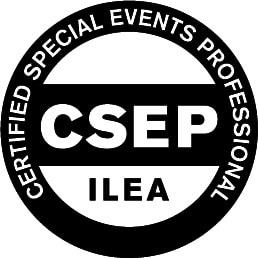
How To Become CSEP Certified
Candidates seeking the CSEP event planning certifications have three Eligibility Pathways:
- At least five (5) years of documented full-time practical experience in the events industry.
- A minimum of three (3) years of documented full-time practical experience in the events industry, along with a letter of recommendation affirming the candidate’s suitability for the CSEP program.
- A minimum of three (3) years of documented full-time practical experience in the events industry, combined with a 1-2 year certificate from a recognized hospitality/events industry program.
3. CMM (Certified Meeting Management)
The CMM program, offered by MPI, aims to establish you as a skilled and credentialed events professional. It covers three key aspects of event planning: business management, leadership, and meeting management. An essential feature of the CMM is that it never expires, ensuring the credentials remain valid indefinitely.
The CMM event planning certifications offer comprehensive training in business management skills, qualifying participants in various topics related to this field, setting a global standard of excellence in the industry.
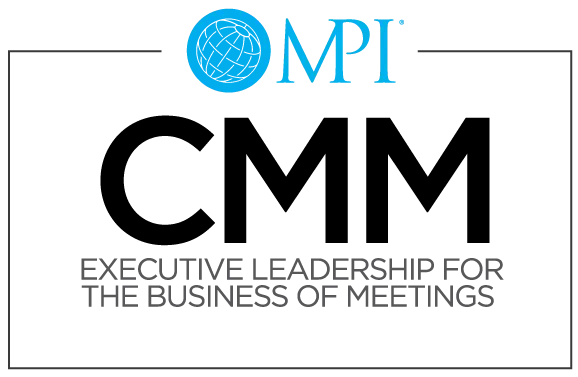
How To Become CMM Certified
Regarded as the pinnacle of professional growth in the industry, attaining a CMM is comparable to earning a mini-graduate event planning degree. The path to achieving a CMP certification involves rigorous academic work, including reading, attending classes, and fulfilling a final project. Candidates must possess a minimum of ten years of experience in the event management field.
Other Widely Recognized Event Planning Certifications
4. CPCE (Certified Professional in Catering and Events)
The CPCE Certification, hosted by NACE (National Association for Catering and Events), is a nationally acknowledged course for event planners. It aims to empower organizers in the catering, hospitality, and events industry, providing them with recognition as experts in their field.
Tailored specifically for catering and event professionals, the CPCE event planning certifications validate a candidate’s experience and expertise in the program’s core competencies.

5. CGMP (Certified Government Meeting Professional)
The Society of Government Meeting Professionals (SGMP) oversees the CGMP certification. This specialized event professional certification is specifically designed for event planners and suppliers who operate within the guidelines and regulations of the federal government.
The certification provides reassurance to government agencies and stakeholders that the certified individuals possess the necessary knowledge and expertise to deliver successful and compliant government meetings and events.
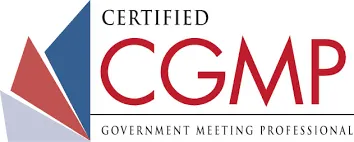
6. GTP (Global Travel Professional)
The GTP certification stands as the sole program catering to event planning within the travel industry. Aspiring candidates seeking this certification are required to possess a minimum of three years of relevant experience in the field. Notably, numerous prominent professionals in the business travel sector have already obtained this prestigious certification, making it a valuable credential for event organizers seeking to match the expertise of these industry leaders.

7. DES (Digital Event Strategist)
Recognizing the significance of digital events and the specialized skills they demand, the Professional Convention Management Association (PCMA) provides a DES certification program tailored to the management of digital events. This program equips participants with the expertise to effectively engage audiences through digital conferencing while offering valuable insights on maximizing profits and achieving a high ROI from these events.
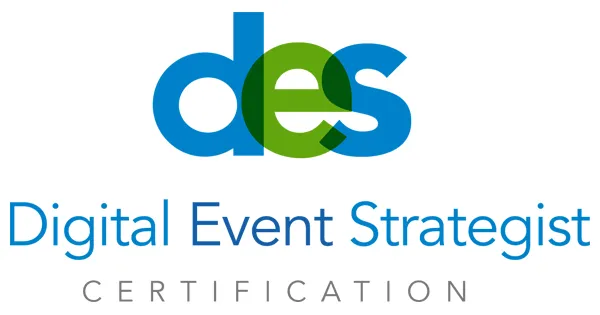
8. CEM (Certified in Exhibition Management)
The CEM designation, established by the International Association of Exhibitions and Events (IAEE), serves as a tailored educational solution for exhibition managers across the globe. This designation is designed to align with the unique career aspirations of these professionals.
Through the CEM program, event professionals undergo a comprehensive educational journey that equips them with the necessary tools for success in their specialized areas of expertise. The primary focus of the program is to offer a holistic and well-rounded learning experience. This experience aims to empower participants with the skills, knowledge, and insights needed to not only excel but also stand out within their respective fields.
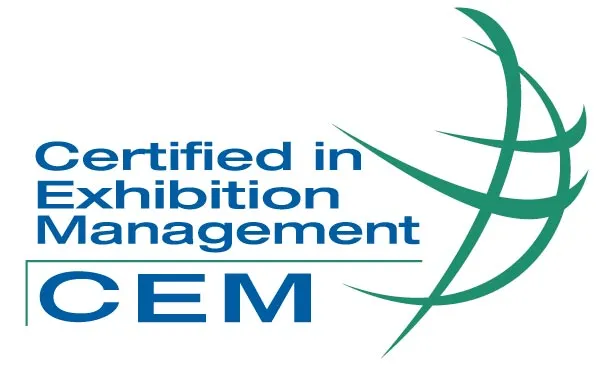
9. CTSM (Certified Trade-Show Marketer)
The CTSM (Certified Trade-Show Marketer) certification stands out as a versatile credential in the realm of event planning. It caters to students who value flexibility in their learning journey. Unlike certifications with rigid timelines and set exam dates, the CTSM program allows learners to progress through the curriculum at their own preferred pace.
The program includes a total of 23 mandatory courses, ensuring a comprehensive coverage of the subject matter. Additionally, participants can choose to enhance their expertise by completing an extra 7.5 hours of elective courses, tailoring their education to align with their interests and goals.
The absence of strict deadlines and the freedom to choose one’s pace makes the CTSM event planning certifications particularly appealing to individuals with busy schedules or varying commitments. This approach not only accommodates different learning styles but also ensures that learners can fully absorb and utilize the knowledge gained, ultimately enhancing their competence and value as event planning professionals.

10. CEPS (Certified Event Planning Specialists)
The CEPS exam is administered by the National Career Certification Board (NCCB) and is designed to equip individuals for a career in event planning. Geared towards entry-level event professionals, this certification can unlock a range of career prospects upon successful completion. While it may not be as comprehensive as some other certifications, it still serves as valuable evidence of expertise, particularly beneficial for those beginning their journey in the events industry.
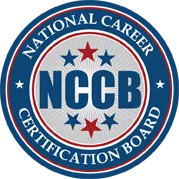
11. CQEP (Certified Quality Event Planner)
The CQEP (Certified Quality Event Planner) certification serves as a strong validation of your capabilities in organizing, marketing, and supervising sizable corporate events. This certification holds significant appeal to both prospective employers and potential clients due to its comprehensive coverage of skills required for successful corporate event management.
The certification process entails a flexible self-paced training course, enabling you to learn at your own convenience and adapt the learning process to fit your schedule. At the culmination of the training, candidates are required to complete a three-hour certification exam.
Earning the CQEP event planning certifications come with tangible rewards. Passing candidates are awarded 30 Professional Competency Units, recognized and accredited by the Management Strategy Institute (MSI). These units are reflective of the practical skills and knowledge acquired during the training and examination process.
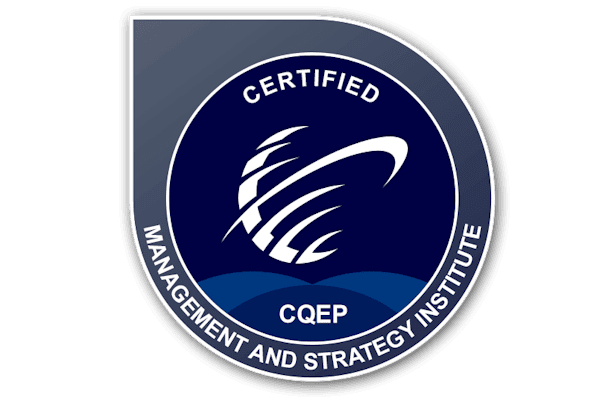
Best Event Management Courses
Lets have a look at top four event planning courses.
1. Events Leadership Institute (ELI)
- ELI offers professional development courses taught by experienced event professionals.
- They provide a multi-week certificate course covering various aspects like event management fundamentals and technical event production.
- ELI’s On-Demand Content library has short, focused videos on specific topics for those with limited time.
2. University of Massachusetts, Amherst, Isenberg School of Management
- UMass Amherst offers an online Meeting & Event Management undergraduate certificate.
- Accredited by the Accredited Commission for Programs in Hospitality Administration, the five-course certificate can be completed in under a year.
- It’s suitable for both experienced and novice planners, and this event organizer course can help prepare for the CMP exam.
3. Special Events Institute (SEI)
- Founded by Jill Moran, SEI offers a year-long certificate program and individualized courses.
- Students learn event planning, marketing, decor, leadership, and hosting basics through lectures, discussions, readings, and presentations.
- Jill Moran, with her extensive experience in special events, shares firsthand insights into the best practices of the events industry.
4. MPI Academy
- MPI Academy offers event management training designed for meeting and event professionals seeking self-paced, online courses.
- They offer on-demand education, including certificate courses and instructor-led courses, accommodating varied schedules.
- Professionals can buy a virtual pass to access previous World Education Congress sessions, earning credit hours for CMP.
- The topics covered range from designing event experiences to event risk management and staying relevant in the ever-changing event industry.
Key Considerations for Choosing Event Management Courses
In a constantly evolving world, the events industry retains its significance in both social and business realms. As the demand for skilled professionals capable of planning and managing diverse events grows, the need for high-quality event management courses has surged as well. However, with an abundance of options available, the task of selecting the most suitable course can be overwhelming. Here are a few essential tips to help you choose the perfect event management course tailored to your needs.
Set Your Objectives and Goals
The first step in choosing the right event management course is to identify your objectives and goals. Are you looking to gain a new skill, enhance your existing expertise, or pursue a career in event planning? Knowing your aspirations will guide you in selecting a course that aligns with what you want to achieve.

Consider Course Content
Event management courses vary in format, duration, and specialization. Before making a decision, review the course curriculum, topics covered, and the way it is delivered. If you have a specific area of interest, opt for a course that offers a specialized track in that field.
Research the Institution
Ensure that the institution providing the course is reputable and accredited. This step is crucial as it helps you gauge the quality of education you’ll receive and make an informed choice about your learning experience.
Evaluate Course Duration
The duration of the course is another essential factor to consider. Some courses may be short, lasting only a few weeks, while others might extend for several months or even years. Select a course that suits your schedule and the time you can dedicate to learning.
Check the Cost
It’s important to select a course that aligns with your budget, as different courses have varying fees. Remember that top-notch education often comes with a higher price point. As you assess costs, consider exploring potential discounts or sponsorship options through your current employer to help manage expenses.
Choose the Delivery Format
Event management courses can be offered online, in-person, or as a combination of both. Consider your preferred learning style and the flexibility you need before choosing the course delivery mode.
Unlock Networking Opportunities
Courses with industry connections and partnerships offer valuable networking opportunities. These relationships can lead to internships, job offers, and other chances for career advancement.
Learn through Hands-On Event Management
A good event management course should provide practical experience in planning and managing events. This might include internships, case studies, and other hands-on opportunities that develop real-world skills.
Read Reviews
Reviews and testimonials from previous students are valuable resources that offer valuable insights into the quality and impact of the event management course. By reading the feedback shared by individuals who have already completed the course, you can get a clearer understanding of what to expect.
Seek Expert Guidance
Consult professionals in the event management industry for advice. Their experience and knowledge can guide you toward a course that equips you with the skills and knowledge needed to thrive in the field.
How to Become an Event Planner with No Experience
Becoming an event planner with no prior experience requires dedication, enthusiasm, and a willingness to learn. While having some background in event management or related fields can be advantageous, it’s not a prerequisite. Here’s a step-by-step guide on how to get into event planning without being certified:
Research the Event Planning Industry
Familiarize yourself with the event planning industry. Understand the different types of events, such as corporate gatherings, conferences, parties, and fundraisers. Learn about the responsibilities and challenges faced by event planners.
Develop Relevant Skills
Event planning requires various skills, including communication, organization, negotiation, time management, creativity, and problem-solving. Look for ways to develop and enhance these skills through online courses, workshops, or volunteering for events.
Network and Connect
Attend local events, industry gatherings, or networking sessions where you can meet established event planners and professionals. Engaging with people in the field can provide valuable insights and potential opportunities.
Work as a Volunteer
Offer your assistance as a volunteer or intern at events. While you may not get paid initially, this experience will allow you to observe and learn from experienced event planners, understand the logistics of events, and build connections within the industry.
Create a Portfolio
Even with no prior experience, you can create a portfolio to showcase your potential. Include any volunteer work, personal projects, or event-related initiatives you have been involved in. Focus on demonstrating your organizational and creative skills.
Start Small
Initially, take on small events for family and friends to gain hands-on experience. This will help you understand the planning process, build confidence, and learn from any mistakes without major consequences.
Educate Yourself
While formal education isn’t a strict requirement, taking relevant courses or certifications in event management can provide you with a solid foundation and enhance your credibility in the field.
Build an Online Presence
Create a website or social media profile to showcase your portfolio, skills, and services. This online presence will make it easier for potential clients to find and hire you.
Offer Competitive Pricing
As you’re just starting, consider offering your services at a competitive price to attract clients and build your reputation. As you gain experience and positive reviews, you can gradually increase your rates.
Stay Updated
The event planning industry is continuously evolving. Stay updated with the latest trends, technologies, and best practices by following industry blogs, attending workshops, and participating in webinars.
Top 6 Websites Offering Event Planning Courses
If you have a passion for event planning or management and are not ready to pursue a full certification or certificate program, you can kickstart your career by enrolling in online event planning courses. These courses are carefully crafted to equip you with fundamental knowledge and skills essential to the events industry. They cater to individuals at different experience levels, from beginners to those seeking to enhance their existing expertise.
1. Event Academy
Event Academy is a specialized event management training provider. They offer comprehensive courses that cover various aspects of event planning, and their training is often used by those aiming for a career in the events industry.
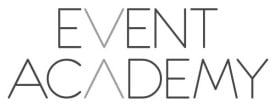
2. Skillshare
Skillshare is an online learning platform that offers a wide range of creative courses, including event planning. These courses are usually in video format and are taught by industry professionals and experts.

3. Udemy
Udemy is an online marketplace for courses where you can find a variety of topics related to event planning. You can seamlessly access the video-based event planning courses created by independent instructors.

4. LinkedIn Learning
LinkedIn Learning offers a vast library of courses, including event planning and management. These courses are video-based and are accessible through a LinkedIn Learning subscription.

5. Coursera
Coursera partners with universities and institutions to offer online courses, including event planning and management. The courses vary in difficulty, and learners have the option to enroll in individual courses or pursue a full specialization.

6. EdX
EdX is another platform that offers online courses from renowned universities and institutions. Their event planning courses cover different aspects of event management and are presented in various formats, such as video lectures and interactive quizzes.

Advancement Opportunities for Certified Event Planners
There is a whole world of possibilities open for you after you have completed your event planning certifications. Let’s explore several strategies that will help you maximize the benefits of your certification and propel your career to new heights.
Specialize
Consider specializing in a specific area of event planning that interests you or aligns with your career goals. This could include corporate events, weddings, nonprofit events, trade shows, or experiential marketing. Becoming an expert in a particular niche can set you apart from the competition and attract more clients in that specific field.
Gain Experience
Experience is key to advancing in any profession. Take on internships, volunteer opportunities, or freelance projects to gain practical experience and build a solid portfolio. As you accumulate more successful events under your belt, your reputation will grow, leading to more significant opportunities.
Seek Leadership Roles
Look for opportunities to take on leadership roles in event planning projects or within your organization. Leadership experience demonstrates your ability to manage teams, handle complex projects, and make critical decisions, all of which are valuable skills in event planning.
Embrace Technology
Stay current with event planning software and technology. Familiarize yourself with tools that aid in event registration, ticketing, attendee engagement, and data analytics. Being a tech-savvy event specialist can give you a competitive edge in the industry.
Create a Personal Brand
Establish a strong personal brand as a certified event planner. This can be achieved through consistent branding, a professional website, an engaging social media presence, and positive client testimonials. A well-established personal brand can attract more clients and opportunities.
Find Your Niche
Identify a specific area of event planning that you are passionate about or have expertise in. Whether you aim to be a corporate event planner or want to manage trade shows, nonprofit gatherings, or experiential marketing, specializing in a niche allows you to become an expert in that field and attract clients seeking your unique skills.
Offer Value-Added Services
Consider providing value-added services beyond basic event planning. For example, you could offer event marketing, social media management, or post-event analytics. Offering comprehensive solutions can make you a one-stop shop for clients’ needs.
Seek Mentorship
Connect with experienced event planners who can offer guidance and mentorship. Learning from seasoned professionals can accelerate your growth and provide valuable insights into the industry.
How to Build and Maintain Your Online Reputation
Building and maintaining a strong online reputation is crucial for certified event planners in today’s digital age. Your online presence can significantly impact potential clients’ perception of your skills and professionalism. Here are some steps to help you build and maintain a positive online reputation:
Professional Website
Create a professional and user-friendly website that showcases your expertise, past events, services, event planning certifications and contact information. Ensure that the website is visually appealing, mobile-friendly, and easy to navigate.
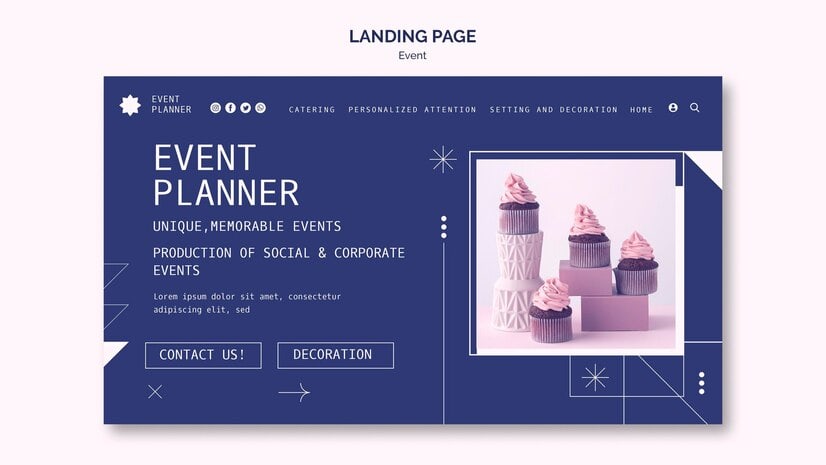
Engaging Social Media Presence
Utilize social media platforms like LinkedIn, Instagram, and Facebook to connect with your target audience. Share engaging content, including event highlights, industry insights, and behind-the-scenes glimpses of your work.
Positive Client Testimonials
Encourage satisfied clients to leave positive reviews and testimonials on your website, Google Business page, or social media profiles. Positive feedback from previous clients builds trust and credibility for potential clients.
Online Portfolios and Case Studies
Maintain an updated online portfolio that showcases your best work and diverse event planning certifications and projects. Consider adding case studies that highlight the challenges you faced and the successful solutions you provided.
Collaborate with Influencers
Partner with influencers or industry experts to co-create content or host collaborative events. Such partnerships can expand your reach and introduce your services to a broader audience. Look for influencers or industry experts whose audience aligns with your target market.
Conclusion
Event planning certifications are a testament to your commitment to professional growth and excellence, setting you apart as a competent and reliable event planner in a competitive market. By investing in certifications, you elevate your credibility, enhance your skill set, and position yourself for long-term success in the thrilling world of event management.
Overall, event planning certifications, coupled with strategic approaches to building your career and online reputation, can provide the competitive edge needed to thrive as a successful and sought-after event planner.
FAQs
Why Should I Pursue Event Planning Certifications?
Pursuing event planning certifications offers several benefits, including enhanced credibility, expanded career opportunities, comprehensive skill development, networking opportunities, and a competitive edge in the industry. It also demonstrates your commitment to professionalism and continuous learning.
How Do I Choose the Right Event Planning Certifications for Me?
Choosing the right certification depends on factors such as your career goals, specialization interests, and budget. Research different event planning certifications, their eligibility requirements, curriculum, and recognition in the industry. Consider what aligns best with your aspirations.
Are There Different Types of Event Planning Certifications?
Yes, there are various types of event planning certifications offered by different organizations. These certifications can focus on different aspects of event planning, such as meetings, exhibitions, weddings, corporate events, and more. It's important to choose one that aligns with your area of interest.
What Are the Eligibility Requirements for Event Planning Certifications?
Eligibility requirements vary depending on the certification. They often include a combination of education, work experience, and sometimes membership in a professional organization. Some event planning certifications may also require a certain number of years of experience in the industry.
Are There Online Courses Available for Event Planning Certification?
Yes, many organizations offer online courses and training programs to prepare for event planning certification exams. These courses provide flexibility for individuals who may have other commitments or prefer to study at their own pace.





